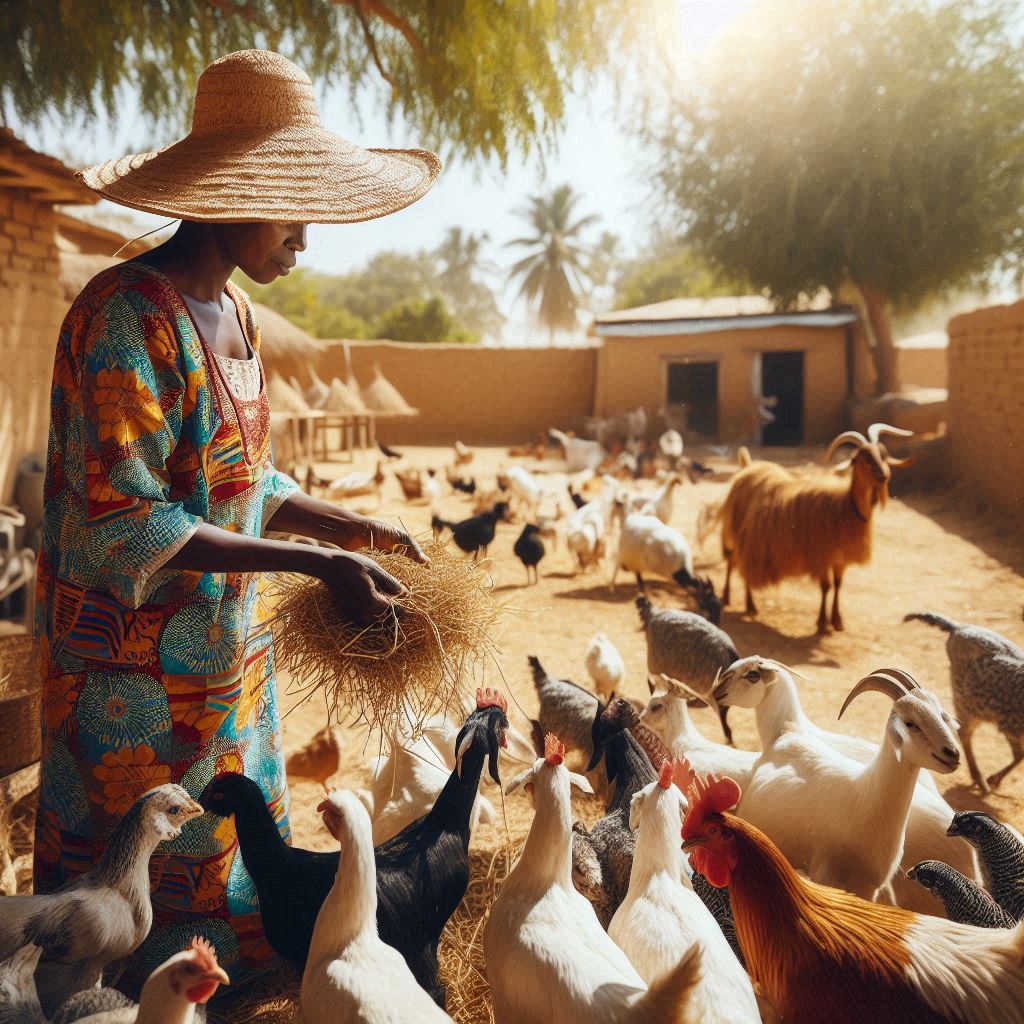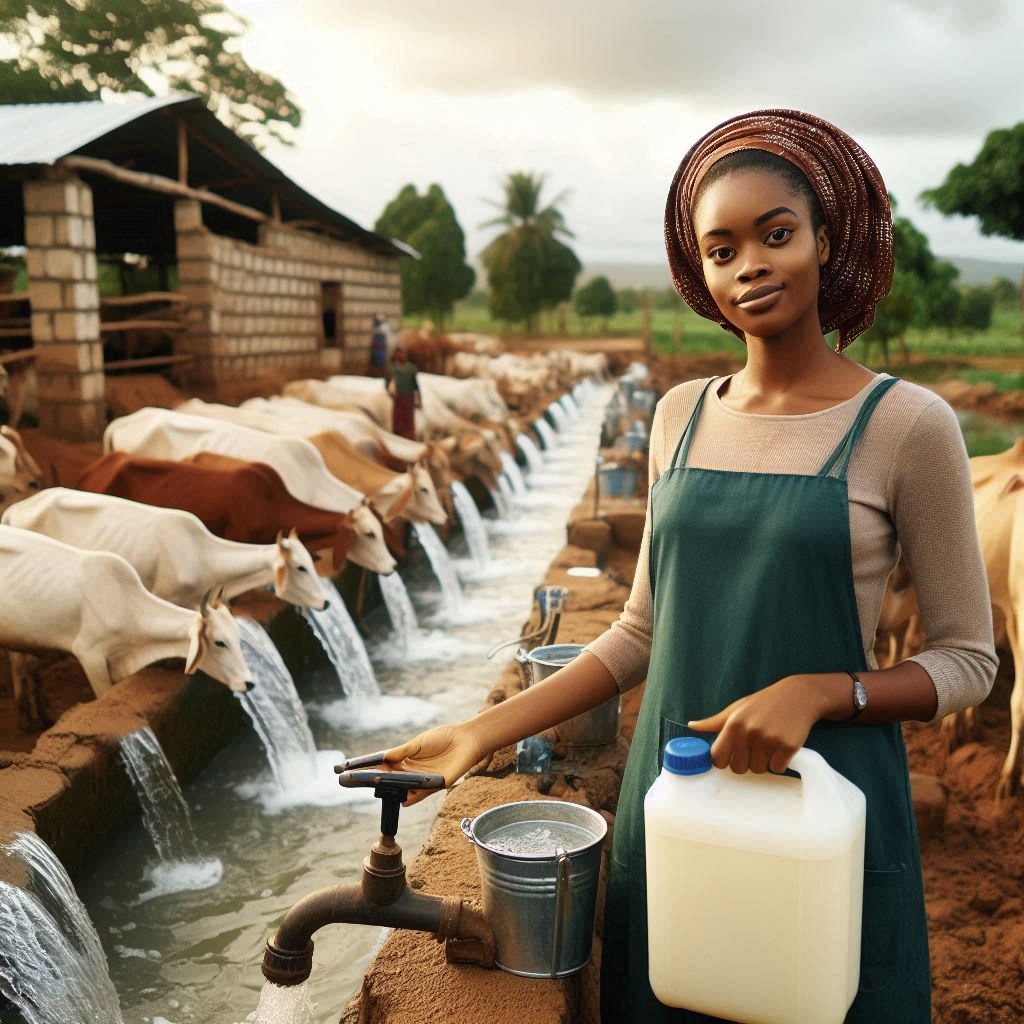Introduction
Genetics in livestock breeding is a fundamental concept that shapes the characteristics and traits of animals over generations.
It involves the transmission of hereditary information from parent animals to their offspring, influencing various aspects such as size, growth rate, milk production, meat quality, and disease resistance.
Understanding genetics is essential for breeders to effectively manage and improve their livestock populations. By selectively breeding animals with desirable traits, farmers can perpetuate beneficial characteristics and minimize undesirable ones.
This process involves careful selection of breeding stock based on genetic merit, considering factors such as phenotype, genotype, and pedigree information.
The role of genetics in determining the traits and characteristics of animals cannot be overstated.
It serves as the cornerstone of livestock improvement programs, allowing breeders to achieve specific breeding goals aimed at enhancing the quality, productivity, and resilience of their herds.
The significance of genetics in livestock breeding extends beyond individual animals to impact the overall sustainability and profitability of farming operations.
Through strategic breeding practices informed by genetic knowledge, farmers can optimize resource utilization, minimize environmental impact, and meet the evolving demands of consumers and markets.
In this section, we will explore the intricacies of genetics in livestock breeding, highlighting its importance in shaping the future of agriculture and fostering innovation in animal husbandry practices.
Genetic Selection in Livestock Breeding
Genetic selection is a crucial aspect of livestock breeding programs, as it allows breeders to improve the genetic makeup of their herds or flocks over successive generations.
Here, we will discuss the process of genetic selection, how genetic traits are passed down from parents to offspring, and the importance of selecting for desirable genetic traits to enhance the overall quality of the herd or flock.
Process of Genetic Selection
- Breeders carefully evaluate the traits of individual animals within their herd or flock.
- These traits may include growth rate, milk production, disease resistance, or other desirable characteristics.
- Based on these evaluations, breeders select the animals with the most desirable traits to be used as parents in the next generation.
- By selectively breeding animals with the best traits, breeders can gradually improve the overall quality of their livestock.
Passing Down of Genetic Traits
- Genetic traits are passed down from parents to offspring through the transmission of genes.
- Each parent contributes half of its genetic material to its offspring, resulting in a unique combination of traits.
- Some traits may be dominant and readily expressed in the offspring, while others may be recessive and require both parents to carry the gene.
- Through careful breeding selection, breeders can increase the frequency of desirable traits in their livestock population.
Importance of Selecting for Desirable Traits
- Selecting for desirable genetic traits is essential for improving the overall quality and performance of a livestock herd or flock.
- Animals with desirable traits are more likely to produce offspring with similar desirable characteristics.
- Improved genetic traits can lead to higher productivity, better disease resistance, and overall better health and welfare of the livestock.
- By focusing on selecting for specific traits, breeders can tailor their breeding programs to meet the needs of their specific production goals.
Basically, genetic selection plays a vital role in livestock breeding by allowing breeders to selectively breed for desirable traits, improve the genetic makeup of their herds or flocks, and ultimately enhance the overall quality and performance of their livestock populations.
Read: Nigeria’s Forest Reserves: A Vital Part of Forestry Education
Impact of genetics on livestock performance
- Genetics play a crucial role in determining the growth rate of livestock.
- Through selective breeding, desirable genetic traits can be passed on to offspring.
- Animals with superior genetics tend to grow faster and more efficiently.
- Improved feed efficiency leads to lower production costs and higher profitability.
- Disease resistance is another key factor influenced by genetics in livestock.
- Animals with strong genetic immunity are less likely to fall ill or require medical intervention.
Genetic diversity and adaptability
- Genetic diversity is essential for ensuring the adaptability of livestock to various environments.
- Animals with diverse genetic backgrounds are more resilient to changing conditions.
- By introducing genetic variation, breeders can enhance the overall health and survival rates of livestock.
- Diverse genetics also provide a buffer against diseases and environmental stresses.
- Through careful breeding programs, genetic diversity can be preserved and enhanced over time.
Successful breeding programs using genetics
- The American Angus Association has implemented genetic testing to improve meat quality.
- By selecting animals with favorable genetic markers, producers can enhance marbling and tenderness.
- The National Swine Registry utilizes genetics to boost growth rates and litter sizes.
- Breeders work with geneticists to identify and propagate traits that improve overall productivity.
- The American Dairy Science Association promotes genetic selection for milk production and udder health.
In general, genetics play a pivotal role in livestock breeding by influencing growth, feed efficiency, disease resistance, and adaptability. Successful breeding programs have leveraged genetics to enhance performance and productivity in various livestock species.
By understanding and harnessing the power of genetics, breeders can continue to improve the quality and sustainability of livestock production.
Read: Comparing Forestry Curriculum: Nigeria vs. Global Standards
Genetic technologies in livestock breeding
Modern livestock breeding practices involve various genetic technologies that play a crucial role in improving genetic traits in livestock. These technologies have revolutionized the industry by increasing efficiency and accuracy in breeding programs.
Genetic testing
- Genetic testing allows breeders to identify specific genetic markers associated with desirable traits in livestock.
- It helps in selecting animals with superior genetic potential for breeding purposes, leading to enhanced productivity.
- By analyzing the DNA of animals, breeders can make informed decisions to achieve desired outcomes in their breeding programs.
Genomic selection
- Genomic selection involves using DNA information to predict the genetic merit of an animal for certain traits.
- It enables breeders to identify the best breeding candidates based on their genomic profile, maximizing genetic progress.
- By incorporating genomic selection, breeders can accelerate the rate of genetic improvement in livestock populations.
Artificial insemination
- Artificial insemination (AI) allows breeders to introduce superior genetics into their breeding programs without the need for natural mating.
- It provides breeders with the flexibility to use semen from genetically superior males, improving the overall quality of the offspring.
- AI helps in maintaining genetic diversity within livestock populations and mitigating the risks associated with inbreeding.
By integrating these genetic technologies into breeding practices, breeders can achieve significant advancements in genetic improvement, leading to higher productivity, disease resistance, and overall quality of livestock.
The benefits of using these technologies are immense and continue to drive innovation in the livestock industry.
Read: Field Work & Practical Training in Nigerian Forestry Schools

Challenges and Limitations of Genetic Breeding in Livestock
Genetic breeding in livestock offers numerous benefits, but it also comes with its fair share of challenges and limitations that must be carefully considered in breeding programs.
Potential Challenges Associated with Genetic Breeding
- Genetic Disorders: One of the primary challenges of genetic breeding is the potential for passing on genetic disorders to offspring.
- Inbreeding: Inbreeding can occur when closely related animals are bred together, leading to a higher risk of genetic defects and reduced genetic diversity.
- Loss of Genetic Variation: Continuous breeding for specific traits can lead to a loss of genetic diversity within the livestock population.
- Environmental Adaptability: Genetic breeding may not always account for the adaptability of livestock to changing environmental conditions.
- Resource Intensive: Genetic breeding programs can be resource-intensive, requiring time, money, and expertise to implement effectively.
Ethical Considerations in Breeding Programs
- Animal Welfare: Ethical considerations must be taken into account to ensure that breeding practices do not compromise the welfare of the animals involved.
- Respect for Natural Processes: Breeding programs should respect the natural processes of reproduction and avoid manipulation that may harm animals or alter their natural behaviors.
- Transparency: Ethical breeding programs should be transparent in their practices, ensuring that stakeholders are informed about the goals and methods used in genetic breeding.
Strategies for Mitigating Challenges in Genetic Breeding
- Genetic Testing: Implementing genetic testing can help identify potential genetic disorders in livestock before breeding occurs, reducing the risk of passing on harmful traits.
- Outcrossing: Introducing genetic material from unrelated individuals can help combat inbreeding and maintain genetic diversity within the population.
- Selective Breeding: Careful selection of breeding pairs based on desired traits and genetic compatibility can help mitigate the loss of genetic variation.
- Long-term Monitoring: Regular monitoring of breeding programs and their outcomes can help identify and address any emerging challenges or limitations.
- Collaboration and Education: Collaboration between breeders, researchers, and policymakers, coupled with education on ethical breeding practices, can help ensure the long-term sustainability of genetic breeding in livestock.
By addressing potential challenges and limitations, implementing strategies to mitigate these issues, and considering ethical implications, genetic breeding in livestock can continue to play a critical role in improving livestock populations for future generations.
Read: Scholarship and Funding Opportunities for Forestry Students in Nigeria
Conclusion
In closing, genetics plays a crucial role in livestock breeding by determining animal traits and characteristics. This knowledge is fundamental for improving livestock quality, productivity, and sustainability.
Selective breeding enables farmers to enhance desirable traits while minimizing negative ones. Leveraging genetic knowledge, breeders achieve specific breeding goals, resulting in healthier, more productive animals.
Looking to the future, advancements in genetic technologies hold significant promise for livestock breeding. Innovations such as gene editing and genomic selection will revolutionize the field.
These technologies allow for precise, efficient breeding practices, potentially eradicating diseases and improving animal welfare. Gene editing could produce livestock that are more resilient to environmental stresses and have enhanced growth rates or nutritional profiles.
Further research and collaboration in genetics are essential for continuing improvements in livestock quality and productivity. Investing in genetic research unlocks new possibilities for the livestock industry.
Collaborative efforts between scientists, farmers, and industry stakeholders drive the development of cutting-edge technologies and breeding strategies. This collective approach ensures the widespread implementation of genetic advancements.
The integration of advanced genetic tools will shape the future of livestock breeding, driving improvements in:
- Efficiency
- Sustainability
- Animal welfare
Continuous innovation and research are vital to meet the growing global demand for high-quality animal products. By embracing these advancements, the livestock industry can achieve greater productivity and sustainability, benefiting farmers, consumers, and the environment.
In summary, the future of genetics in livestock breeding is bright and full of potential. Continued research, collaboration, and the adoption of new technologies will ensure ongoing improvements in livestock quality and productivity.
Genetic advancements will create a more efficient, sustainable, and resilient livestock industry capable of meeting future challenges and demands.




